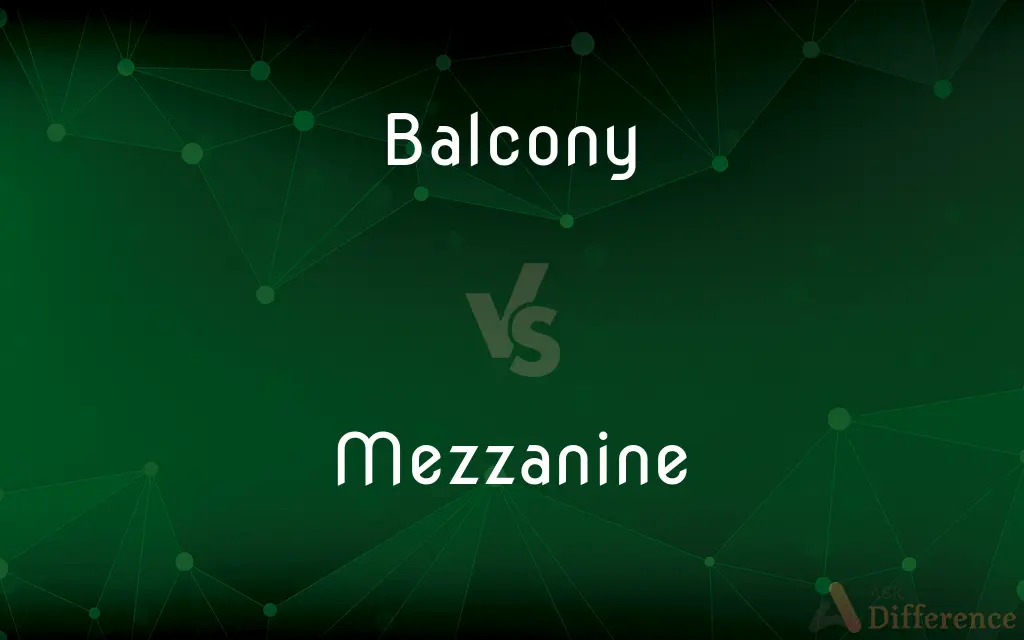Balcony vs. Mezzanine — What's the Difference?
Edited by Tayyaba Rehman — By Fiza Rafique — Updated on October 24, 2023
A balcony is an outdoor extension of a building's upper floor, while a mezzanine is an intermediate level inside a building, typically between two main floors.

Difference Between Balcony and Mezzanine
Table of Contents
ADVERTISEMENT
Key Differences
Balcony and mezzanine are architectural terms that refer to distinct parts of a building. A balcony is an elevated platform that protrudes from the side of a building, providing an outdoor space. In contrast, a mezzanine is an intermediate floor situated between two main floors, often overlooking the floor below.
A balcony can be found in residential, commercial, or theatrical settings. It serves as an outdoor extension of a living space, allowing occupants to enjoy the outdoors. On the other hand, a mezzanine might be used to create additional space within a building without constructing an entire new floor, offering a unique perspective of the space below.
A building might have multiple balconies on different levels, each offering a view of the surroundings. Mezzanines, on the other hand, enhance the utility of a building by offering an additional, semi-private space without necessarily being fully enclosed or separated from the rest of the building.
While balconies often have protective railings to ensure safety due to their outdoor nature and elevation, mezzanines might feature railings, half-walls, or might be completely open, depending on the design and purpose.
Both balconies and mezzanines serve as spatial enhancers, each with its unique function. While balconies provide an external retreat, mezzanines optimize internal space usage.
ADVERTISEMENT
Comparison Chart
Nature
Outdoor
Indoor
Function
Extended space with an external view
Intermediate floor between two main floors
Position
Protrudes from a building
Inside a building
Safety Features
Usually has protective railings
May or may not have railings
Usage
Residential, commercial, theatrical
Commercial, residential, entertainment venues
Compare with Definitions
Balcony
A raised area, especially in a church.
The choir sang from the balcony above the congregation.
Mezzanine
A low story between two main stories of a building.
The mezzanine featured cozy reading nooks.
Balcony
An outdoor platform extending from a building's upper floor.
From her fifth-floor balcony, she watched the sunset.
Mezzanine
A balcony in an auditorium or theater.
We sat on the mezzanine level for a better view of the stage.
Balcony
A gallery in a theater or auditorium.
We got seats in the balcony to watch the play.
Mezzanine
An elevated section providing a secondary vantage point.
From the mezzanine, visitors could see the entire art exhibit.
Balcony
An elevated area used for display or observation.
Visitors could view the entire expo from the balcony area.
Mezzanine
An intermediate floor inside a building.
The bookstore added a mezzanine for more shelf space.
Balcony
A decorative feature resembling a platform.
The ornamental balcony adorned the mansion's façade.
Mezzanine
A space used for special purposes within a large room.
The mezzanine in the convention center held VIP lounges.
Balcony
A balcony (from Italian: balcone, "scaffold") is a platform projecting from the wall of a building, supported by columns or console brackets, and enclosed with a balustrade, usually above the ground floor.
Mezzanine
A mezzanine (; or in Italian, a mezzanino) is, strictly speaking, an intermediate floor in a building which is partly open to the double-height ceilinged floor below, or which does not extend over the whole floorspace of the building. However, the term is often used loosely for the floor above the ground floor, especially where a very high original ground floor has been split horizontally into two floors.
Balcony
A platform that projects from the wall of a building and is surrounded by a railing, balustrade, or parapet.
Mezzanine
A partial story between two main stories of a building.
Balcony
A gallery that projects over the main floor in a theater or auditorium.
Mezzanine
The lowest balcony in a theater or the first few rows of that balcony.
Balcony
(architectural element) An accessible structure extending from a building, especially outside a window.
Mezzanine
Of or relating to securities granting a claim on interest or assets that is subordinate to that of secured and senior debt but above that of equity.
Balcony
An accessible structure overlooking a stage or the like.
Mezzanine
(architectural element)
Balcony
A platform projecting from the wall of a building, usually resting on brackets or consoles, and inclosed by a parapet; as, a balcony in front of a window. Also, a projecting gallery in places of amusement; as, the balcony in a theater.
Mezzanine
An intermediate floor or storey in between the main floors of a building; specifically, one that is directly above the ground floor which does not extend over the whole floorspace of the building, and so resembles a large balcony overlooking the ground floor; an entresol.
On our way to the top floor, we stopped at the mezzanine.
Balcony
A projecting gallery once common at the stern of large ships.
Mezzanine
(by extension) An apartment, room, etc., on such an intermediate floor.
Balcony
An upper floor projecting from the rear over the main floor in an auditorium
Mezzanine
The lowest balcony in an auditorium, cinema, theatre, etc.; the dress circle.
Balcony
A platform projecting from the wall of a building and surrounded by a balustrade or railing or parapet
Mezzanine
(obsolete)
Mezzanine
A floor under the stage, from which contrivances such as traps are worked.
Mezzanine
Characteristic of or relating to high-interest loans which have no collateral, and are regarded as intermediate in nature, ranking above equity but below secured loans.
Mezzanine
(engineering) Fulfilling an intermediate or secondary function.
To make interconnections easier, we added a mezzanine PCB.
Mezzanine
(transitive) To fit (a building or other place) with a mezzanine floor.
Mezzanine
Same as Entresol.
Mezzanine
A flooring laid over a floor to bring it up to some height or level.
Mezzanine
A floor under the stage, from which various contrivances, as traps, are worked.
Mezzanine
The lowest balcony in a theater, or the forward part of the first balcony.
Mezzanine
First or lowest balcony
Mezzanine
Intermediate floor just above the ground floor
Common Curiosities
Is a balcony always attached to a room?
Most balconies are attached to rooms, offering an external extension of the indoor space.
What is a balcony's primary purpose?
A balcony provides an outdoor extension from a building's upper floor.
Do all balconies need railings?
While not all, most balconies have railings for safety reasons due to their elevation.
How is the safety of a mezzanine ensured?
Mezzanines may have railings, half-walls, or be open, depending on design and safety needs.
Can a balcony be found inside a building?
Typically, balconies are outdoor platforms, but the term can also refer to a gallery in a theater or auditorium.
Can a mezzanine be found in residential settings?
Yes, mezzanines can be found in both residential and commercial settings.
Can a balcony serve a decorative purpose?
Yes, some balconies are purely ornamental and may not be accessible.
Can a mezzanine overlook an open space?
Yes, mezzanines often overlook the floor below, offering a unique perspective.
Are all mezzanines indoors?
Yes, a mezzanine refers to an intermediate indoor level between two main floors.
Is a mezzanine considered a full floor?
No, a mezzanine is an intermediate floor, not a full main floor.
How is a balcony different from a terrace?
A balcony is an elevated platform, while a terrace is typically a flat, paved area at ground level or on top of a building.
Are mezzanines exclusive to theaters and auditoriums?
No, while mezzanines can be found in theaters, they are also common in commercial buildings, homes, and other venues.
Are balconies common in all types of buildings?
Balconies are common in residential, commercial, and theatrical settings but might not be present in all building types.
Do balconies increase the value of a property?
Often, balconies can add value due to the additional outdoor space and views they offer.
Can mezzanines have stairs leading to them?
Yes, mezzanines often have staircases or elevators for accessibility.
Share Your Discovery

Previous Comparison
Colloid vs. Suspension
Next Comparison
Prayer vs. SupplicationAuthor Spotlight
Written by
Fiza RafiqueFiza Rafique is a skilled content writer at AskDifference.com, where she meticulously refines and enhances written pieces. Drawing from her vast editorial expertise, Fiza ensures clarity, accuracy, and precision in every article. Passionate about language, she continually seeks to elevate the quality of content for readers worldwide.
Edited by
Tayyaba RehmanTayyaba Rehman is a distinguished writer, currently serving as a primary contributor to askdifference.com. As a researcher in semantics and etymology, Tayyaba's passion for the complexity of languages and their distinctions has found a perfect home on the platform. Tayyaba delves into the intricacies of language, distinguishing between commonly confused words and phrases, thereby providing clarity for readers worldwide.
















































